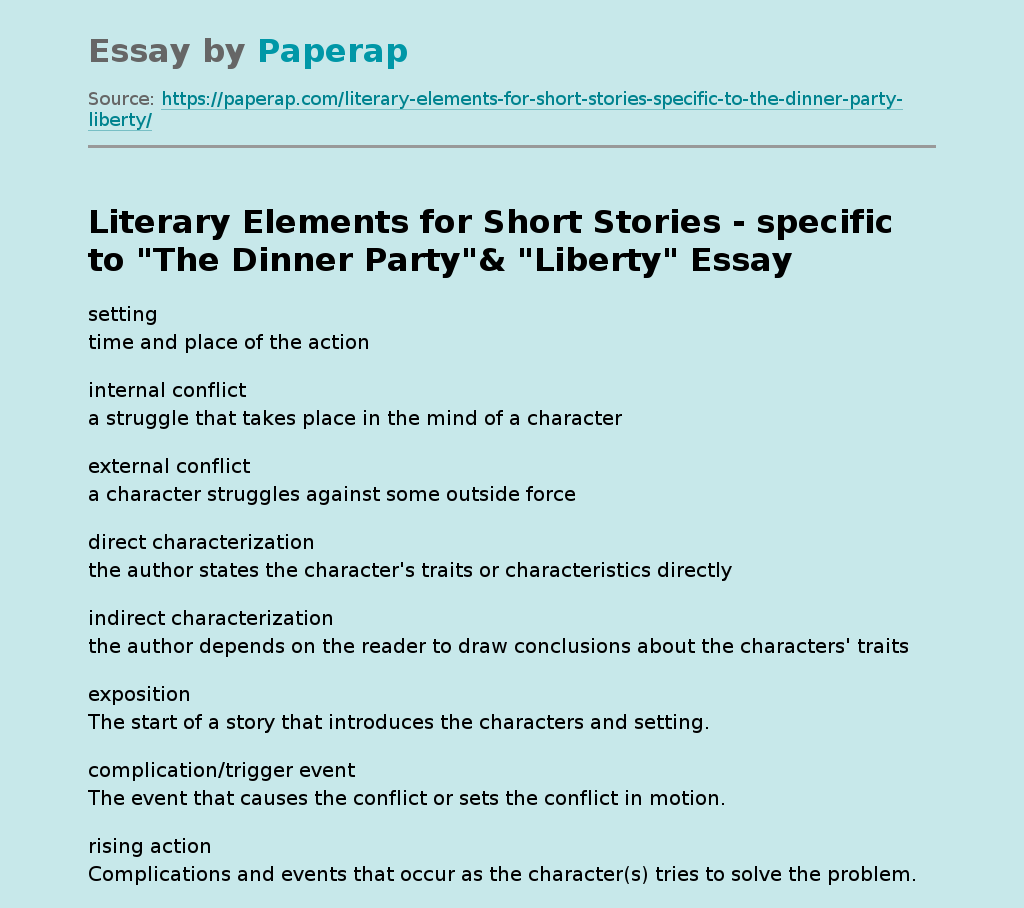Literary Elements for Short Stories - specific to "The Dinner Party"& "Liberty"
Topics:
Behavior
Essay,
Pages 4 (752 words)
Views
445
setting
time and place of the action
internal conflict
a struggle that takes place in the mind of a character
external conflict
a character struggles against some outside force
direct characterization
the author states the character’s traits or characteristics directly
indirect characterization
the author depends on the reader to draw conclusions about the characters’ traits
exposition
The start of a story that introduces the characters and setting.
complication/trigger event
The event that causes the conflict or sets the conflict in motion.
rising action
Complications and events that occur as the character(s) tries to solve the problem.
climax
The point of highest interest, suspense, or greatest emotional tension.
falling action
The events that occur as the character works toward the resolution of the conflict.
resolution
A satisfactory conclusion that is either positive or negative for the character.
double entendre
a word or phrase that can be interpreted two ways
idiom
a phrase or fixed expression that has a figurative meaning (its meaning is not meant to be taken literally)
suspense
an intense feeling the audience goes through while waiting for the outcome of certain events
symbolism
use of symbols to signify ideas and qualities by giving them symbolic meanings that are different from their literal sense
irony
a discrepancy between an anticipated and realized outcome
stereotype
to believe unfairly that all people or things with a particular characteristic are the same
theme
1. a universal message or moral told through the story
2. the “lesson” the author wants you to learn from the story
2. the “lesson” the author wants you to learn from the story
exposition – examples from stories
D. The reader learns the story takes place in colonial India.
L. The dog Liberty is introduced.
L. The dog Liberty is introduced.
complication/trigger event – examples from stories
D. The American notices the hostess’s face muscles contracting slightly and her summoning her servant to place a bowl of milk on the veranda.
L. Papi has taken the American’s side against his government, putting his life and the lives of his family members in danger.
L. Papi has taken the American’s side against his government, putting his life and the lives of his family members in danger.
rising action – examples from stories
D. 1. The American looks around the room for a snake. 2. The American begins a game to keep the guests from moving.
L. 1. The narrator meets two strange men hiding behind the hedge. 2. Mami is so worried she doesn’t scold the narrator about little things. 3. They get their visas and must pack and say goodbye.
L. 1. The narrator meets two strange men hiding behind the hedge. 2. Mami is so worried she doesn’t scold the narrator about little things. 3. They get their visas and must pack and say goodbye.
climax – examples from stories
D. The snake emerges, and the American shuts him out.
L. The narrator has to be mean to Liberty to get him to run away, to save him from being killed.
L. The narrator has to be mean to Liberty to get him to run away, to save him from being killed.
falling action – examples from stories
D. The host compliment the American for demonstrating “perfect control.”
L. Liberty leaves the narrator’s yard and heads into the world.
L. Liberty leaves the narrator’s yard and heads into the world.
resolution – examples from stories
D. Mrs. Wynnes responds, “Because it was crawling across my foot.”
L. The narrator realizes the “liberty” her aunt talked about is freedom, not her dog.
L. The narrator realizes the “liberty” her aunt talked about is freedom, not her dog.
setting – – examples from stories
D. colonial India; early 1900s; evening; in a fancy dining room
L. Dominican Republic; 1950s; at the narrator’s house
L. Dominican Republic; 1950s; at the narrator’s house
internal conflict – examples from stories
D. Mami doesn’t want to leave her country, but she knows she has to.
L. The American struggles to think of a way to keep the other dinner guests calm.
L. The American struggles to think of a way to keep the other dinner guests calm.
external conflict – examples from stories
D. Mrs. Wynnes and the snake are in conflict because the poisonous snake on her foot could bite her.
L. Mami and Liberty are in constant conflict because Mami doesn’t like Liberty, and Liberty can be a pest.
L. Mami and Liberty are in constant conflict because Mami doesn’t like Liberty, and Liberty can be a pest.
direct characterization – example from story
L. “I had always been the tomboy…”
indirect characterization – example from story
L. The narrator is honest.
theme – examples from stories
D. Women have just as much emotional control as men.
L. Liberty involves sacrifice.
L. Liberty involves sacrifice.
double entendre – example from story
L. The word liberty has two meanings in the story: the name of the dog and freedom.
idiom – example from story
L. “Her face looked as if she’d light into him after she was done with Liberty.”
irony – example from story
D. The colonel argues that a man has “one more ounce of nerve control than a woman has,” but it is a woman who demonstrates great nerve control in the story.
suspense – example from story
D. “The boy’s eyes widen; he quickly leaves the room.”
symbolism – example from story
L. The dog Liberty represents freedom.
stereotype – example from story
D. “A woman’s unfailing reaction in any crisis…is to scream.”
Literary Elements for Short Stories - specific to "The Dinner Party"& "Liberty". (2019, Jan 31). Retrieved from https://paperap.com/literary-elements-for-short-stories-specific-to-the-dinner-party-liberty/
